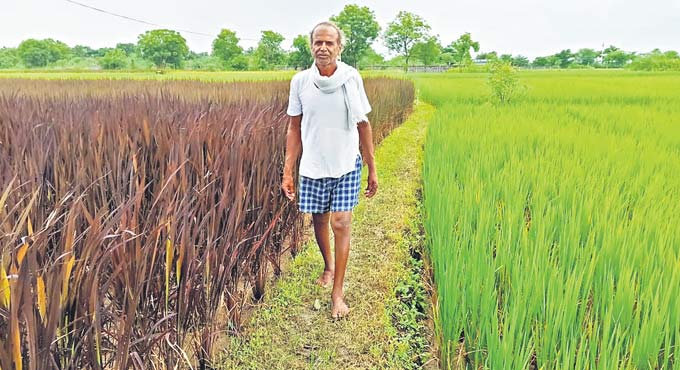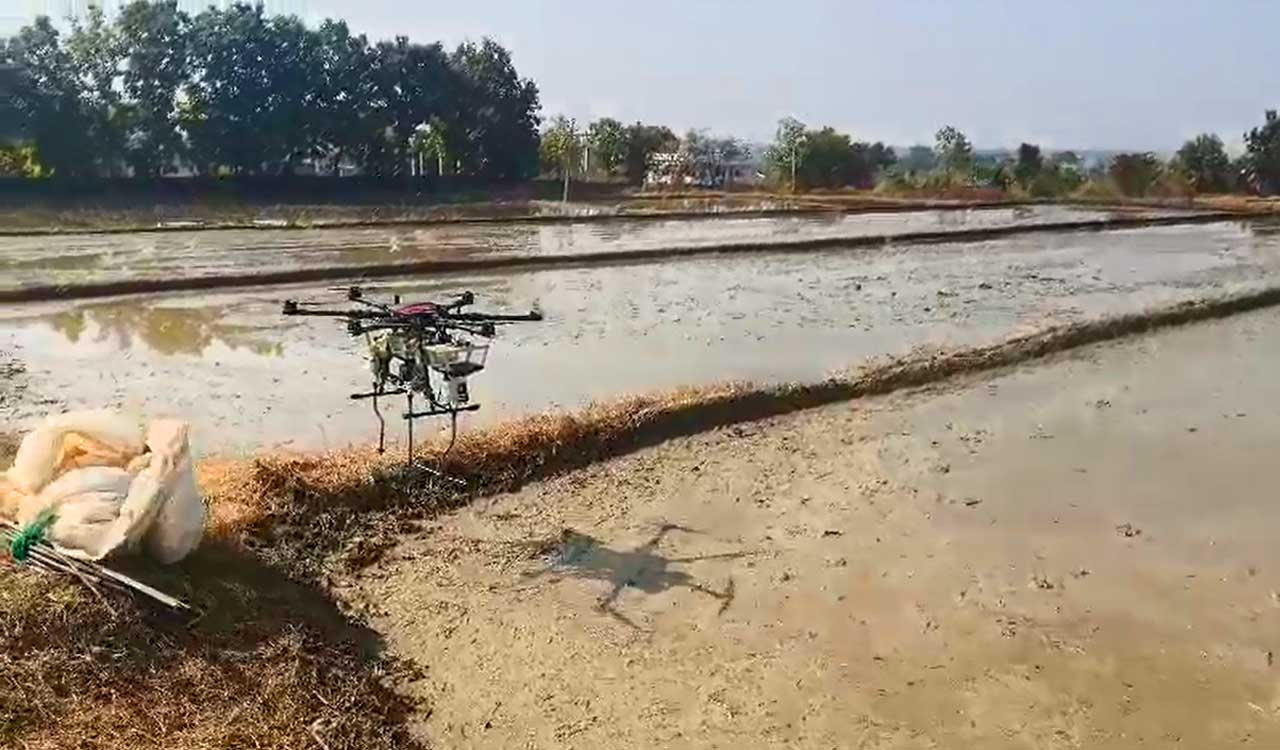‘Bank’ on this Nizamabad farmer for 110 paddy varieties
Nagula Gangaram, popularly known as ‘Chinni Krishnudu’ is the proud owner of a ‘Grain Bank’ of mind-boggling 110 varieties of paddy

Nizamabad: An unyielding passion for agriculture, an inquisitive mind, and a never-say-die spirit can make for a heady concoction that can only lead one on the path to success, even for a high school dropout.
Nagula Gangaram, popularly known as ‘Chinni Krishnudu’ among the Nizamabad populace, is not just another progressive farmer who is in sync with changing times. He is the proud owner of a ‘Grain Bank’ of mind-boggling 110 varieties of paddy, some of them from foreign shores and many that give the high-yield hybrid varieties a run for their money.
Such is his collection that he claims credit for having the largest number of paddy varieties by an individual farmer with only agriculture universities and research institutes coming anywhere close to his collection. In fact, even the National Institute of Nutrition (NIN) approached him for black and red coloured paddy varieties to carry out research.
Beginning his tryst with paddy research a couple of decades ago, Gangaram, in a chat with Telangana Today, said that among his collections are some paddy varieties that are almost extinct, others that have medicinal values and several indigenous seeds that he developed including ‘Chinni Krishna,’ a high yield variety that he claims to have developed and named after himself.
His namesake variety, Gangaram says, has a high resistance to pests and diseases besides requiring the much lower intake of water compared to the average variety.
The 63-year-old farmer, who uses a 3-acre patch of land at Gupanpally on the city outskirts for his paddy research, says one of his objectives is to protect and preserve some of the traditional varieties that are giving way to the hybrids invading the market. He also collected and developed paddy varieties that he bought from different parts of the world including the US, Japan, Thailand, Pakistan and Italy, to name a few.
When these countries refused to part with their paddy seed, Gangaram bought brown rice (unpolished with a thin layer that can germinate) of those varieties from these counties and cultivated them in his field and developed the seed. “My main objective is to conduct extensive research and provide various paddy seed to farmers who are interested. I also encourage them to try out different varieties,” he said.
For Gangaram, the three-acre land is his research centre, and he is currently cultivating 24 types of paddy. Among his collection are varieties such as Kala batti, Burma black, Kamgayavalli, Ganga Japanese Rice, Purple Rice, Kala Butt, Karpu Kani, Mapillai Samba and Chattisghar.
On the red variety list, he has Nawara, Ganga Red rice, Ganga Ruby Red rice, Khaji Sala, Pancha Ratna, Thoka Sala, Laicha, Ungare and Nagnath. Apart from black and red, Gangaram also developed green, light green, brown, white, purple, scented and basmati varieties of paddy in his field.
Some of them, he says, have medicinal properties while others are natural wonders. ‘Kala Batti’ is totally black in colour, including its stalk, while ‘Kala Butt,’ another variety of black rice, has stalks and grain that are green.
On paddy with medicinal properties, Gangaram says Raktha Shali has high iron content that is good for people suffering from Anemia, Kala Batti that prevents various types of cancers besides being a cure too, Karpu Kani that helps in reducing obesity and Nawara that has properties to control nerve disorders and diabetes.
Mapillai Samba rice, he says, helps in increasing sperm count in men while Laicha rice is good for lactating mother if taken as a porridge. Pulakar, another variety, helps pregnant women since it aids in normal deliveries awhile Kala Jeera and Chitti Mutyalu are scented rice.
Gangaram says he is particularly proud of four varieties that he developed including Chinni Krishna which is thin grain and can be harvested in 135 days. The rice yield from this paddy is as much as 74 kg per quintal of paddy. “Several farmers in Nizamabad are cultivating this variety,” he said.
Another variety he is fond of is Bahurupi, an indigenous variety that gives a yield of 35 bags or 28 quintals of paddy per acre with low water consumption. “This is particularly good since it gives a tough competition to the hybrid varieties besides pest-resistant,” he said.
So, how did he get the name Chinni Krishnudu? “Well, I was very interested in local drama and I used to play the role of young Krishna, and the name stuck to me,” he says with a twinkle in his eyes. So, how did he get the name Chinni Krishnudu?
“Well, I was very interested in local drama and I used to play the role of young Krishna, and the name struck to me,” he says with a twinkle in his eyes.
Now you can get handpicked stories from Telangana Today on Telegram everyday. Click the link to subscribe.
Click to follow Telangana Today Facebook page and Twitter .
Related News
-
Clinical India subdue Pakistan as Ishan, Bumrah anchor victory
35 mins ago -
Israeli strikes kill 11 in Gaza amid fragile truce: Civil defence
44 mins ago -
Sports briefs: Gurunath wins gold and silver in Abu Dhabi Masters Games
45 mins ago -
India’s rising momentum in para cycling events
51 mins ago -
Football for Schools launched across Telangana
58 mins ago -
Mano Tej wins 237th Brilliant Trophy Chess Tournament
1 hour ago -
Opinion: Iran on the brink—Why escalation in West Asia will cost India dearly
1 hour ago -
Editorial: New political era, new challenges
2 hours ago




